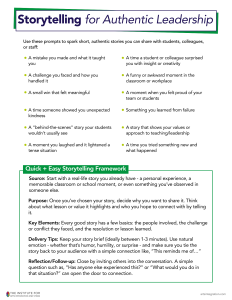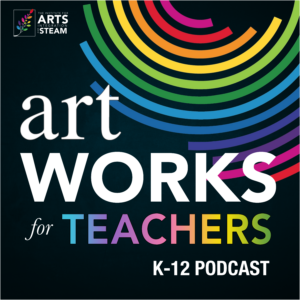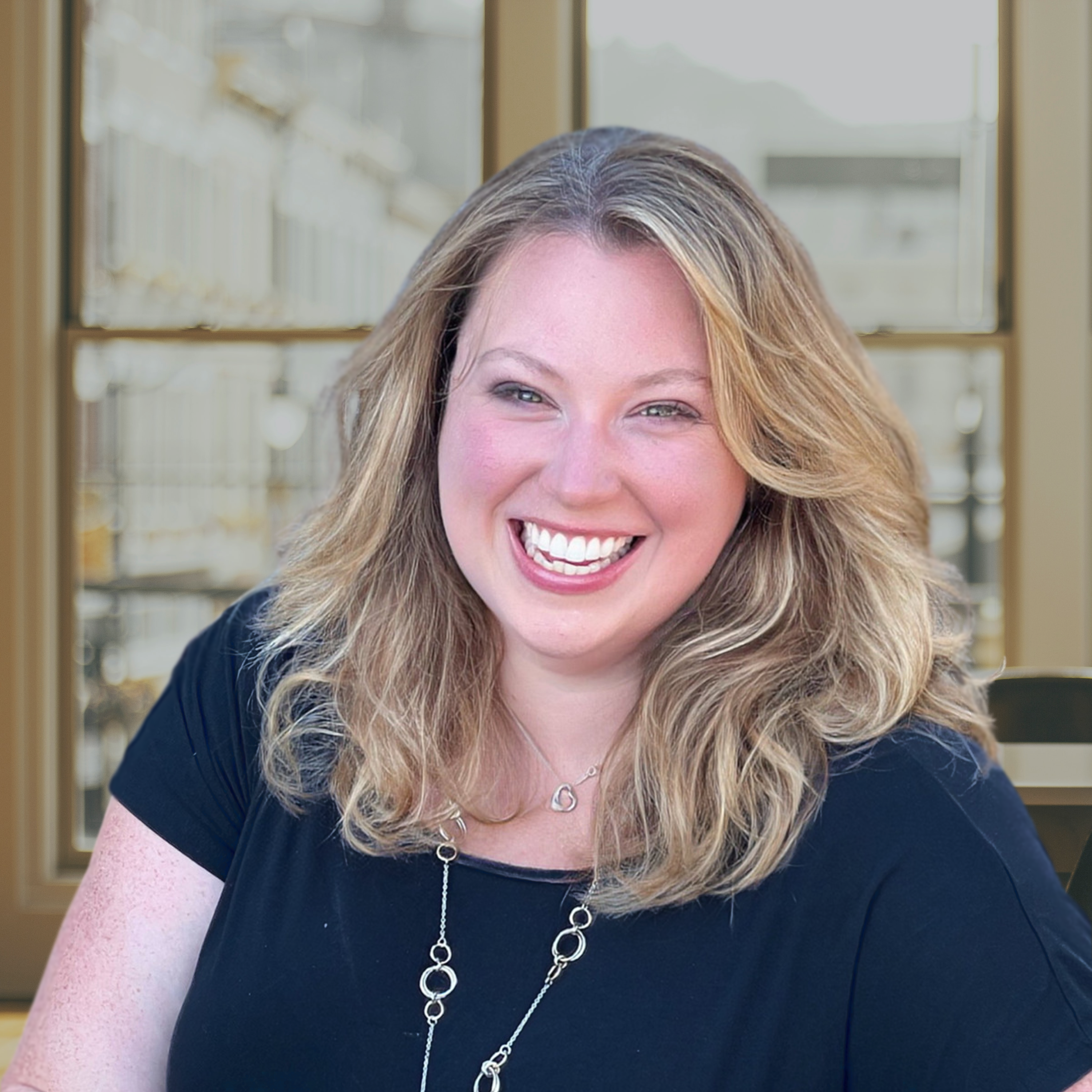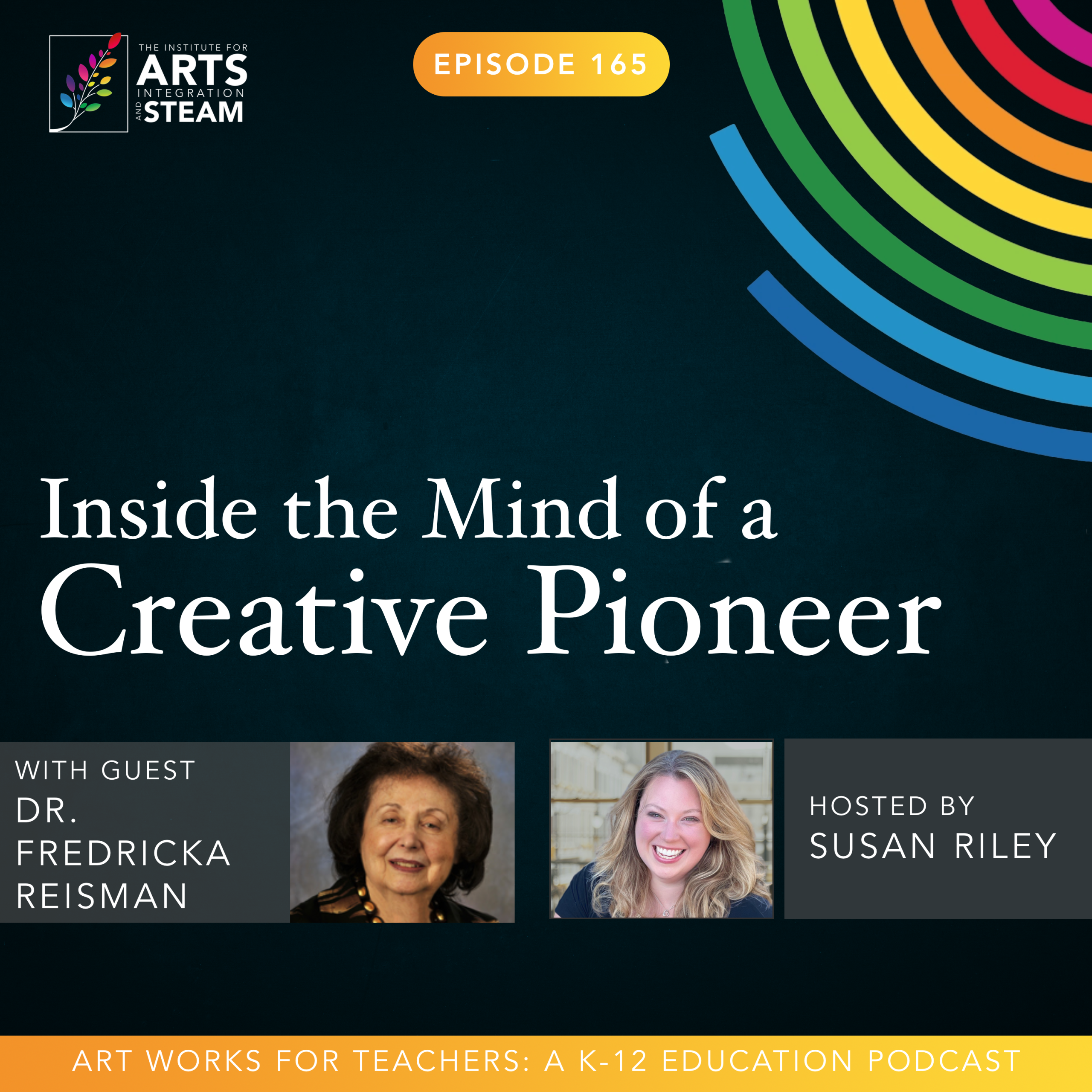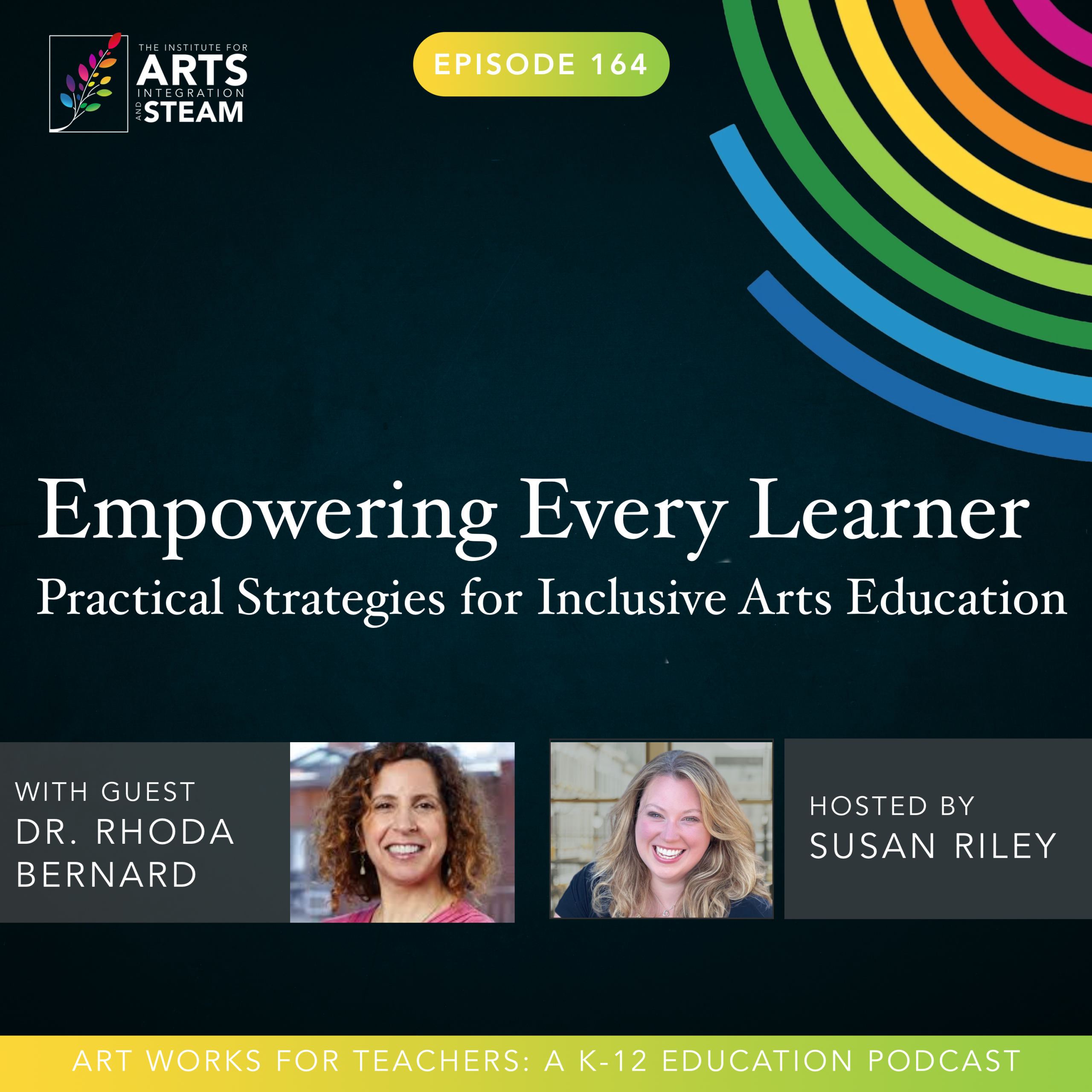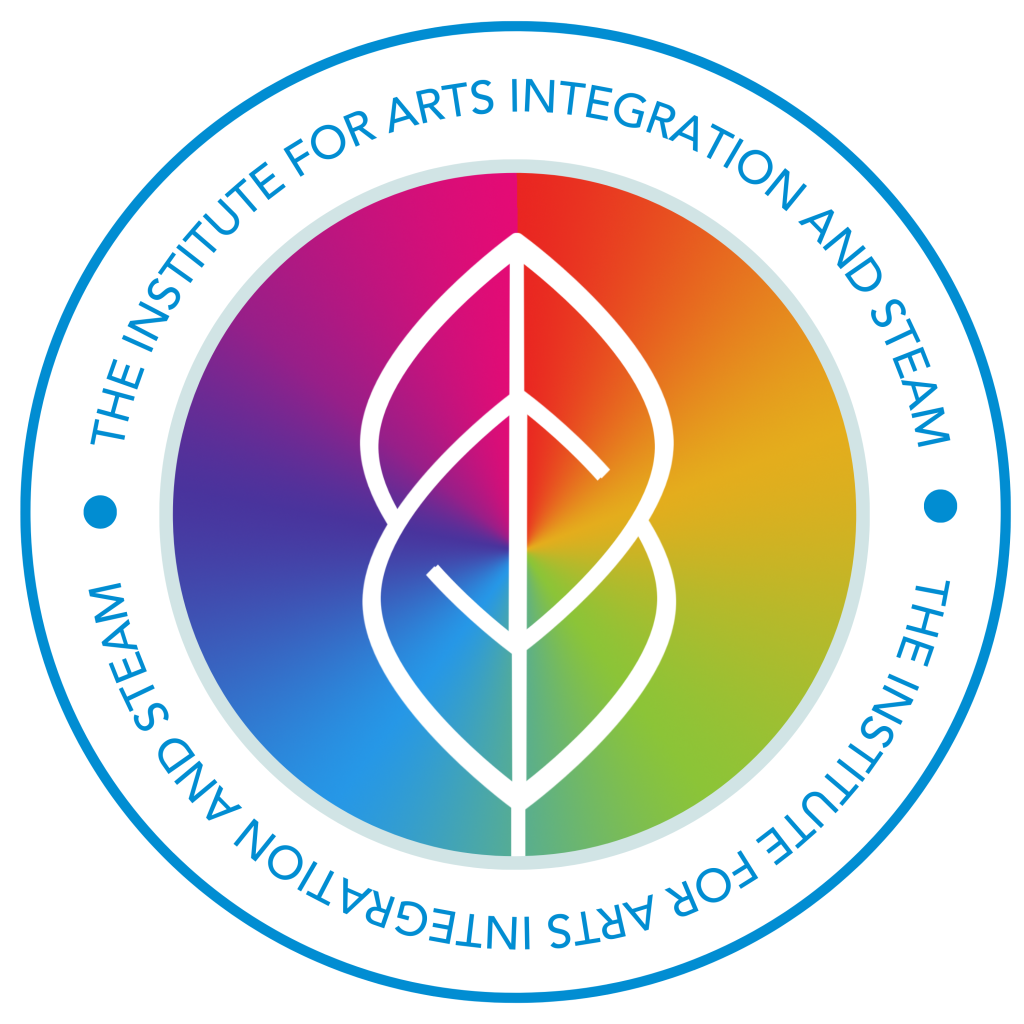ART WORKS FOR TEACHERS PODCAST | EPISODE 157 | 35:48 MIN
Authentic Leadership: How Humor and Humanity Build Stronger School
Enjoy this free download of the Storytelling Framework resource.
All right, well, welcome, Tracey. I’m so glad that you’re here today. wonderful. Okay, so I always like to start by allowing our guests to tell a little bit about your journey into education and how you ended up where you are. And I think your journey is so exciting because I don’t think I’ve ever met someone who was a paraprofessional who ended up at the state level. So I would love to learn more about how you did that.
Tracey
Thank you, Susan. Well, it has been a long and fascinating journey. I graduated from college with a degree, with a bachelor’s degree in psychology. And I learned quickly, not a whole lot you could do that, but what you can do with that is to get, to have a role as a para at a school for children who had special needs. So I started as a para with kids who were classified ED, BD, severely autistic. And you know, in every challenge, a gift. And I learned so many things by working with tough kids, because when you have a tough clientele…
You have to be a good teacher. And so they taught me so much in that role. And that’s where I fell in love with the classroom. I got my master’s in special ed, and I was a special ed teacher and then a master teacher in that school. I was then a special ed teacher in Millburn, New Jersey, which was a very intense environment, very affluent, very discerning parents. And you know, in there, there is a gift as well, because you better be on your game, because they were gonna tell you about it otherwise.
And it was in that role I decided I wanted to do more for kids and colleagues. Got my doctorate in leadership at Seton Hall and I was a vice principal and then a principal and a superintendent and then a chief academic officer for the Department of Education, director of student performance pre-k to 12 and then in 2018 I retired.
But my daughter will tell you I retired very badly because I am continuing to show up for schools and districts and organizations because my purpose in life, the reason I get up in the morning is to do this really important work. And that is to work elbow to elbow with teachers and leaders in the service of students.
So that’s pretty much the journey. If you were to ask me, well, okay, so how did you do that? I would say this.
At the heart of it, I truly love the work and I have remained a student of the craft. So I read and I write and I research and I remain humble as a learner as well as a teacher because I share with others what I learn and a leader because I want to influence people. want to have impact that makes a difference in the learning lives of kids who I may never actually meet.
Yeah, it’s about working really hard and just staying really dialed in and dedicated.
Susan
I love that. honestly, as somebody who has her own mother who retired badly, I’m so grateful for you because I think there’s such, it’s a privilege to retire badly. And I think it is also something that we need. We can continue to learn from you. There’s so much more that you have to offer clearly because you are, you’re doing it every day.
I love that you continue to stay a student. I work with people from all gametes, you know, in the work that I do. I see teachers from beginning stages, baby teachers, all the way to teachers who’ve been doing it for 40 years. And the best ones are always the students, are always the ones who stay that humble. with all of the roles that you’ve had in schools and in districts, I’m curious what patterns or lessons have stood out to you in terms of school culture in particular and success.
Tracey
Well, I think first we have to honor and acknowledge how hard it is. So we have to recognize that there are a lot of forces and factors that have made this work of teaching and of leading extremely difficult. So I think first we have to not pretend like it isn’t really hard and we have to acknowledge and honor that work.
We also need to stay connected to a shared purpose. What is the compelling purpose? What is our shared mission? What are we here to do? Because I find that when we lose sight of our why, both the individual why that causes us to show up fully and our collective why, what we are all here to achieve together, we get lost and we lose our way and we have a, we just,
We struggle and we flounder and we and you know I meet people who are wondering and worried whether they can keep showing up and what I find for those folks is what they need is to reconnect with their power with their passion, with their purpose and their potential to leave a lasting legacy in the hearts and minds of the people with whom we work and the students who we have the privilege to teach. I think what lies at the heart of it is relationships. think we need to make sure that every single person feels known and noticed and valued. I mean, when we speak each other’s names,
Our whole brain lights up, you know? It’s about really coming together and doing this work with all that we have to offer.
Susan
Yeah. So I have some questions on that. So I want to dig into it a little bit deeper because I know that you are also very practical about looking at the things that actually shift the work, make it meaningful, make a difference for students. And I have interviewed, I’ve had the privilege to interview a lot of leaders and a lot of leaders will say relationships are important and we need to remember our why. And I think, you know, in 2025, a lot of teachers are going to be like, I got that on my bingo card. I checked that off, right? Because they hear it so often. They hear it from leadership. They hear it from others. But what they’re struggling with is the practical. OK, so how do I do that? Right? Like, how do I connect with my way in a way that’s authentic to me and to you, develop relationships with students who are incredibly challenging or are disrespectful. How do I do that when I’m trying to build a relationship? How do I do that so that my students are successful and in a way that’s something that they’re going to connect with now with me? Yeah.
Tracey
Okay, I love what you’re saying, Susan, because you’re saying, look, people say these words, we talk about what we need to do, and often we convey why we need to do it, but here’s where the rubber meets the road, and that’s how. And I think one of the things that distinguishes the work that I do from others is I go beyond the, you know, those vague kind of… know, platitudes, and we really do the why. So when I work with adults, I model the strategies that build connection, a sense of belonging and relationship, and bake it right into the PD. So for example, every time I… do anything with anyone. start with a check-in. So the check-in is just like a slide deck that I created with funny ways to have people turn and ask the person next to them. What I say is the most important question you will ask during the course of any day. And that is, drum roll, how are you? See, I think we have lost sight of we think it’s hard and the power is in its simplicity. When you ask people just to turn the person next to them and say, how are you? And up on the screen, I have those silly things that you’ve seen a million times. It’s the different sheep. It’s Patrick from SpongeBob. It’s puppies. It’s cats. It’s all those things. And people look and they laugh and they say, you know, today, on that image number nine where the sheep is like, all has it’s like, And here’s why. You see, we have to realize that these things don’t just happen. We have to foster these connections by design. So one way that I do it is through check-ins. And when the energy rises and the people are laughing, I say, did you see what happened? It can be as simple as that. And the truth is, whether you ask it or not, the answer’s gonna show up in your room. So one of the mistakes we make is believing that there’s so much content to cover that we don’t have time for connection. And that is wrong. That you will go farther, faster with your colleagues and your students when we start by just saying, how are you? So that’s just one simple way. Another thing that I do with teachers, is we do collective, let’s say at the beginning of the year, a collective intelligence resume. That’s when teachers work with their PLCs or their teams and they talk with each other about the gifts and the expertise that they’re bringing to the work. How many years have we taught? How many districts or schools have we been in? What degrees do we have? Certificates. What strengths do we bring to the work because teachers aren’t often comfortable sharing what they’re good at. And so this is a way to surface those things. I have a lot of… activities that aren’t just vacuous, silly kind of things, but really cause people to share. I’ll give you another example that I do in my PDs. say we walk around with photo albums, trying to look for them, with photo albums in our pockets. And what do we have in our phones? It’s the people and the things that matter the most to us. So what I say, for example, is find a picture that brings you joy or a sense of pride, share it with someone. So they share it with someone and again here’s the energy, here’s the and I say to them after raise your hand if you learned something new about someone who you everyone raises their hand and I hear things like I didn’t know you had five boys, I didn’t know your daughter just got married, see we’re not connecting and there’s lots of ways to invite people to connect around their interests, their passions, their beliefs, their activities. Like when people find out, I ride motorcycles, they’re like, oh yeah, like you, yeah. You know, they find out I took trapeze lessons. Me too. What was it? It’s about providing a space, a time, an opportunity for us to get to know each other. And it’s a lot harder to be unkind to people we know. So those are just simple ways. I want to address the, how do we stay in touch with our why? Here’s my way.
Bertram Russell said years ago that a healthy thing to do every now and again is hang a question mark on that which we take for granted. So what I do is I take the mission or the mantra and I say, read it to yourself as a statement, as it is written and now, and I changed the slide, read it as a question.
And Susan, what that does is it provokes a sense of wonder. It introduces doubt. says, are we really doing these things or are these just aspirations, intentions? Is this just what we profess or are these the values we live? And when we revisit that, when we use questions rather than statements,
It can keep us in touch with continually evaluating the degree to which we are walking in our why.
Susan
Yes. Tracy, what I love about what you’re saying in all of this is that the work isn’t just the grind. The work is truly our relationships with people. is truly the work, right? That is the work. When teachers say, have so much work to do, or I just want to get to the work, the work is the people, right? And I loved what you said earlier. You had this little gem that I think might have just slipped by people that said, you said it’s going to show up anyway. Whether you spend time on it or not, it’s going to show up, right? So you might as well take the time to know what it is up front, right? Yeah.
Tracey
That’s right. And he doesn’t, I tell teachers, it doesn’t have to hijack the lesson and it doesn’t have to take over the meeting. It just honors the energy people bring in the room. And you can circle back and show concern. It’s just so important to realize that we do high stakes work and I dare people on occasion, name for me one profession that does high stakes work alone. It doesn’t exist. If you have a loved one who is unwell, would you want them in the care of one person or a team? You want a team. And we have to shape and change the way we see our work. It’s what we do for our kids, not what I do for mine.
Susan
Yes, absolutely. Well, and what’s, I gotta tell you, when you were talking about all of the different things that maybe people wouldn’t know, it’s like when you share ideas with each other and getting to know you, one of the things that I have learned about you is that you yourself have done some standup comedy recently. And I’m so intrigued to know more about that for you. Like what sparked that and what has humor taught you about the classroom?
Tracey
Yes, well, so, you know, I go to a lot of schools and districts and in as much as they are different, there was something I noticed that they had in common and that was that… that there was a sense of despair. People seemed despondent. There was low morale. The mood was somber. And what I remember and loved the most from my years in the classroom was the joy and the fun and the funny because kids do and say funny things. mean, if you think about it, like schools are really funny places.
But somehow we’ve just, we’ve lost that spark. And so what I thought is, and this has been common throughout my career, I can complain about it or do something about it. And I took comedy lessons as a way to find ways to bring the joy back to teaching and learning and leading. And here was the unintended benefit. When I was taking comedy lessons, you know, you need material.
So when you need material that’s funny, you go through life and the world looking for what’s funny. And there’s a lot out there. And what happened is it shifted my perspective. Instead of focusing on the latest affront or insult, what made me angry or fearful or worried, I started to look for… all those things that are humorous. So for example, I was driving down the road and I saw a poster advertising tutoring T U D O R I N G. I was like, and I pulled over and I took a picture because that’s funny. You know, if you can see that, right, that’s funny. And,
Susan
That is funny.
Tracey
You know, when I was in a classroom, so I was in a seventh grade classroom and the principal came on and said, your attention, your attention scholars. So everyone was quiet. We will now execute Alice.
And one boy looked at the other and he goes, who’s Alice? And the other boy goes, and what did she do? Now, some of you may know Alice is a drill protocol, right? For how to have lockdown drills. But who would come on the announcements and say to an entire middle school that you’re about to execute Alice?
So I really believe, Susan, I believe that every day we make a choice, whether to go on a witch hunt or a treasure hunt. And my promise is you will always find what you’re looking for. And we need to look into our hearts, into our classrooms, at our students for the good to seek to bear witness to the good. But we’ve started to focus so much on deficits and what’s broken and what’s bad, that that’s what we live in. that was the thing. And I have just woven more of the fun and funny into my PD. And what I’ve discovered is when people are laughing, it is literally disarming. People put their weapons down and they lean in and they open themselves up and we laugh together. And people remember what is funny. I mean, the research is, there’s a solid research base to justify the use of humor in schools. It improves attention, retention, creativity, diversity of thinking. It builds a relationship. It’s so healthy.
And it, you know, I’m not going to go on a lifelong, you know, venture now of comedy, but what I am certain to do is to bring that into the professional development, for example, that I offer and just the way I talk with people.
Susan
Yeah, yeah. So and I, here’s another great example of this in terms of what I think you’re talking about is the sharing, the collective sharing of an experience, right? So whether that’s humor or like one of the most meaningful things that we had happened at our conference this summer was that our one of our keynoters, Susan Magsamen, had asked everyone in the room, a thousand of us, to sing This Land is Your Land, just to sing it all together. And there was no like, underlying motive behind it. We just wanted to sing together and it was stunning. mean, people started to do harmonies out of the blue and just, I mean, we did like three verses and just as a collective unit, there was no other benefit other than to just have an experience together. And the amazing things that were happening in your brain. I mean, Susan brought it up and talked in her keynote, all the things that your brain did during that season.
But I could tell you it felt, it just felt good in a room that you were working collectively with. And I think the same is true of laughter. You know, you are engaging in laughter, creativity, anything that is for the collective good in a positive way, I think is so important. And so I’m, I’m curious, how do you bring the joy back in such a time when we are so focused on analytics and data and yes, that’s important. I’m not discounting that, but how do we balance the need to be focused on that analytical data with these creative, engaging moments that we can have together of joy and creativity?
Tracey
Well, first, I think it’s important for us to think about what Jim Collins taught us years ago in his landmark book, to Great. He talked about the tyranny of the or and the genius of the and. And one of the things that I ask of educators is to meet me in the land of and, where we can have rigor and relationships, standards and smiles, content and care. When it comes to data, my approach to data is this, that at the heart of it lies curiosity and a relentless wonder about how we’re teaching is showing up in what kids are learning. And so I believe that it’s a false dichotomy to believe we are doing data or being creative because some of the most amazing experiences in creativity have come after we’ve looked at the data and we’ve noticed some things and then we engage in question storming. So what is question storming?
Many times brainstorming is when we’re looking for answers. Questionstorming is when we’re riffing about what if, what if, what if, and that’s the essence of creativity is going beyond what is or what has always been to what if we did this, what if we did that, what if we did this. And it feels very freeing because there’s no judgment, there’s no filters.
But we’re opening our hearts and minds to the possibility that there are lots of other ways that we can achieve better or different results. So I want us to believe that when we’re doing data, we are also being creative. We’re looking at other ways, other possibilities to really, you know, kind of like riff in that space.
Susan
Yes, yes, I think that’s so important. And I think, you know, we’ve actually focused a lot in this show in the last several weeks on the difference between problem solving and problem and then solving, right? And taking your time with the problem. And I love this idea of question storming because yes, it brings up the possibilities, it showcases those first. And I wanna shift from that because I think part of… part of what we’re talking about here is being open and honest and vulnerable with folks that we’re working with, which is really the hallmark of what your book, Mistakes, Missteps and Misopportunities is, right? I would love for you to share a little bit more about that because you’re really focusing and embracing honesty and leadership, which is so not common. And it reveals a lot about that vulnerable area of honesty.
So talk to me a little bit more about that.
Tracey
Well, for many years I had a goal to write a book and people had said, look, you’ve worn so many hats, you’ve seen so many things, write that book of leadership. And there was something that felt so off putting about sitting down and write a book that said, you know, be perfect like me, because that’s not real. What is real is struggle. And when we… when we falter, when we even fail, when we fall down. And what I found missing in the literature on leadership was a book written from the humble perspective of a leader who’s worked really hard and at times faltered or even fell. Because it is in how we pick ourselves up. I believe that it’s real and relatable and human and honest to talk about the times it didn’t go as we had hoped. And let’s think about this, Susan. Schools are places where we ask people to take risks. We say to teachers, try it. We say to students, take a stab at it. No, you don’t know. Yes, it’s hard.
I mean, how inauthentic if we’re asking that of all of those folks and the leader isn’t willing to be raw and real about taking risks as well. So this was written very much with a humble heart and with great vulnerability. Mistakes, as I define them, mistakes are times when I should have known better, but I didn’t do better. A misstep is when you’re brand new in a career and you don’t know better.
You do things, but you didn’t know. It’s your first time walking that path. And the missed opportunity is when the regrets are not about what you did, but what you didn’t do. Those times you didn’t negotiate hard enough for yourself. When you drove home… and you weren’t present for your family. It’s all those times where your heart aches for what you didn’t do. And the whole book is written in tiny teaspoons so that everything is written. For example, it’s on just, you know, it’s like one.
It’s two page, that’s all it is. Because I know teachers and leaders are busy. They’re somewhere between whelmed and overwhelmed and asking people to sit down and read a book feels daunting. my goal was to write a book that offered a lot and asked very little. You can literally open it anywhere and read something that may speak to a need that you have.
Susan
I love it. And it’s so practical. And it’s real. It makes me feel like I am right there with you as well as in the same, like that we are on the same level. It’s not a hierarchy. We all are in it for the same reason. And we’re working towards those things and that you understand that as well, even given your vast leadership experience. So I so appreciate that about the book. We are definitely going to put a link to that in our show notes. And I love that. I didn’t know it was on Audible.
Tracey (26:55.56)
Yes. Thank you. And it’s not audible. If you want, I can point it to you. I can even read it. Yes.
Susan
That’s fantastic. Yes. Before we close out though, and I can’t believe we’re already at this time and I’ve had such a good time learning from you today, Tracy. I’m curious about one last thing and that is around school positivity, optimism, and where we’re headed. Because if you turn on the news right now, everything about schools is negative. It’s teachers aren’t paid enough. There’s all of the apathy that’s happening that there’s public schools are dying.
There’s like all of these just sad stories out there. And I don’t want to discount that it is that we are living in a very tumultuous time when it comes to education. But given all of your experiences and where you’re coming from as well, and I think you said it so great and so eloquently before about the you seek, you will find what trends or ideas have stood out to you that make you optimistic for the future of education right now.
Tracey
I will begin by just honestly saying that I am worried for us, that I have heard educators counseling out bright stars, their nieces, their nephews, their sons and daughters and saying, you’re so capable, why be a teacher? So we have to stop promulgating a narrative that… that causes people to not wanna come in and be teachers. So I wanna say that we have to be mindful of the stories that we tell. And I think much of our experience and my optimism lies in telling the breakthrough stories, the things that make us proud. And while outside of schools, whether it’s the political context, whether it’s… you know, all of these forces and factors, the discontent and so forth. When I go in school, Susan, it’s so good because there are beautiful, beautiful children. There are teachers who really care. And so it’s almost like on a certain level at times, have to, we have to put the outside world on mute.
And we have to focus and love and nurture the people in our house, like in our school. So the people who are showing up are really doing brave, important work. We need to recognize each other. have to understand ADD is the most common issue and it’s… appreciation deficit disorder. need to appreciate, Susan, we need to smile. The easiest way to change a school is to smile. It costs nothing and requires no PD. I believe in us because we are powerful. And when we focus on the good,
We notice more of the good, which incentivizes us to keep coming back and hopefully we’ll recruit new people into the field because it’s a glorious, wonderful field and people are respected and revered and remembered forever. You are remembered forever when you are a teacher.
Susan
Well, Tracy, you may get better for all of us as well. And I so appreciate your time today. Where can people stay in touch and find out more information about you, your work, your PDs, and your book?
Tracey
All right, well, I would say I have a very good website. So it’s it’s doc sev. We could put that on there. D O C S E V. I teach for results. I have a calendar that shows where I’m going and where I’ve been. I’m going to be at four national conventions or rather conferences for Accutrain. do podcasts and I show up for people. So if you just reach out, if you even Google my name,
Susan
Absolutely, we can put this in the show notes, yeah?
Tracey
Dr. Tracy Severns, you’ll find me and if you call me, I’m going to answer you and I’m going to show up for you as I said in whatever way that you need.
Susan
Thank you so much for your time today, Tracy. You certainly showed up for us today. I appreciate it.
Tracey
Appreciate it. Thanks, Susan.

